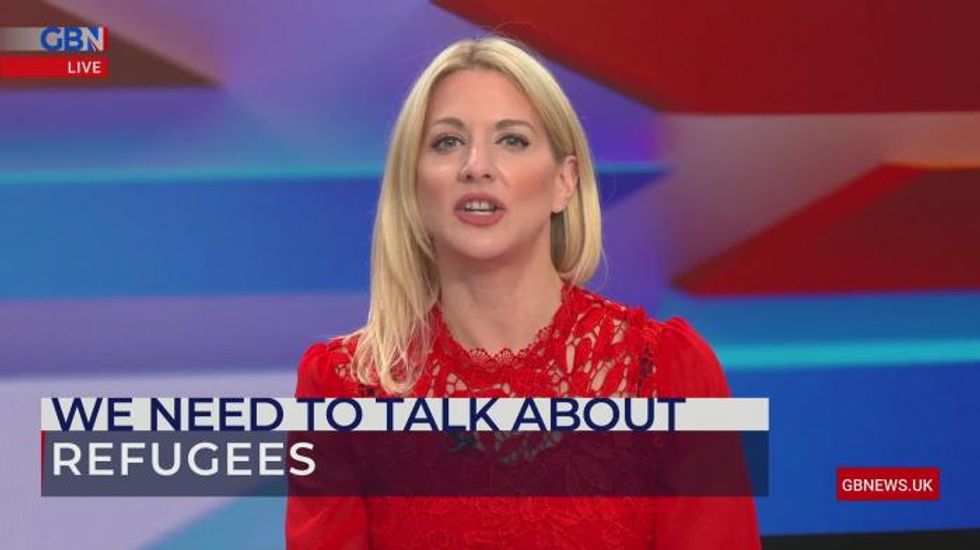Don't Miss
Most Read
Trending on GB News
What would make you hand over your life savings to a terrifying network of hardened criminals, with no regard for human life and the power to continue to threaten, extort and control you for the rest of yours?
What would make you put your eldest son into the back of a truck, crushed and dehydrated and packed like cattle to the slaughter under a crude canopy as the vehicle bounces across endless miles of barren terrain, every now and then the butt of an AK-47 smashed into his ribs as the human cargo is traded from criminal to criminal.
What would make you beg, borrow and steal to attain papers, to subsist in violence and squalor for months on end in the hope that you will safely make the passage to a promised better life abroad? I would imagine, quite a lot. Thankfully these are decisions you and I will likely never have to take.
Yet as boats continue to wash up on our shores and pictures flicker on our screens of fighting-aged young men scrambling up the shingle, is it sympathy we feel? Or fear and contempt? Are these people really who they claim to be? Why should we help them, before we help the deprived, the discarded and the distressed born here?
It is the motivations for these costly, perilous and oftentimes deadly passages that make the moral issues over migration so complex. Perhaps you are an Albanian, seized by criminal gangs and forced to pretend to be from Syria or Afghanistan in order to traffic you into the UK to work in slavery or risk bloody retributions to the family you left behind.
Perhaps you fled for your life, from chemical weapons, persecution, your home raised to the ground, the life you had built scattered amongst the rubble of your nation. Perhaps you have been sweet-talked by a middle man, who in return for the village’s collected capital, will guarantee you a high paying job in Europe where you will be able to send money home to protect your weak and ailing parents.
Perhaps you have been lying in wait in a refugee camp, patiently biding your time, hidden amongst the scores of victims your vile fraternity of extremists has destroyed and displaced, ready to camouflage yourself amidst the desperate chaos to get into a country and carry out a horrific atrocity.
As millions of Afghans are internally displaced and tens of thousands seek passage to safety in Europe, many more invisibly crossing the border forced into the backs of airless trucks that threaten to suffocate them before arrival, the answer to what we should do with the mounting arrivals is as elusive as their crushed together identities.
Today, Europe is erecting towering chicken wire fences along its frontiers, desperate to not repeat the social experiment following the greatest migratory flow Europe has ever witnessed when Angela Merkel announced that all refugees were welcome.
Today, the snaking caravan of humanity moving across a continent to settle, or be tossed, from country to country, often via the hands of some of the most dangerous criminal networks, finds its flotsam and jetsam of paperless, faceless, landless individuals finally percolating along the coastline of the Channel, Britain, their final hope.
What on earth do we do about this? What is a refugee? An asylum seeker? An economic migrant? An illegal imposter? How do we know to whom we should extend the hand of hospitality, and who should be deported, back to the very countries they had toiled to escape? When crime rates among asylum seekers in all countries tend to outnumber those of the domestic population, particularly sexual assaults and frauds, how can we ensure we provide sanctuary to those who deserve it while preventing those who would not integrate or have no desire to assimilate from gaining access?
We cannot import entire populations from failed states. We cannot provide housing, jobs and welfare to those in countries plagued by poverty ahead of the needs of our own citizens. We cannot take every poor wretch from every warzone, unable to discern or discriminate between the persecuted and the persecutor.
Yet also, we are a long way off ever solving the world’s complex tapestries of problems to ensure such mass migratory flows can be stemmed. Mass exodus has existed throughout homosapien evolution. We are all the product of nomadic troupes, resettling, seizing, integrating.
Yet despite it being inherent to our very anthropology, few developed nations on earth seem to have found the answer to managing their borders, and it remains an issue upon which elections are won and lost.
Major changes are today proposed to the UK’s refugee settlement schemes and border policy, from remote processing centres in Africa, funding refugee settlements abroad, to the criminalisation of those caught pursuing illegal passage across the channel, alongside turning boats back to France while simultaneously promising refuge to twenty thousand Afghans.
Yet the who, what, when, where, why and how all remain precariously unaddressed as we grapple between exhibiting compassion on a case by case basis while the eye watering statistics, international criminality and concealed consequences of open borders require hard-nosed and dispassionate decision making.
Today, we need to talk about refugees.











